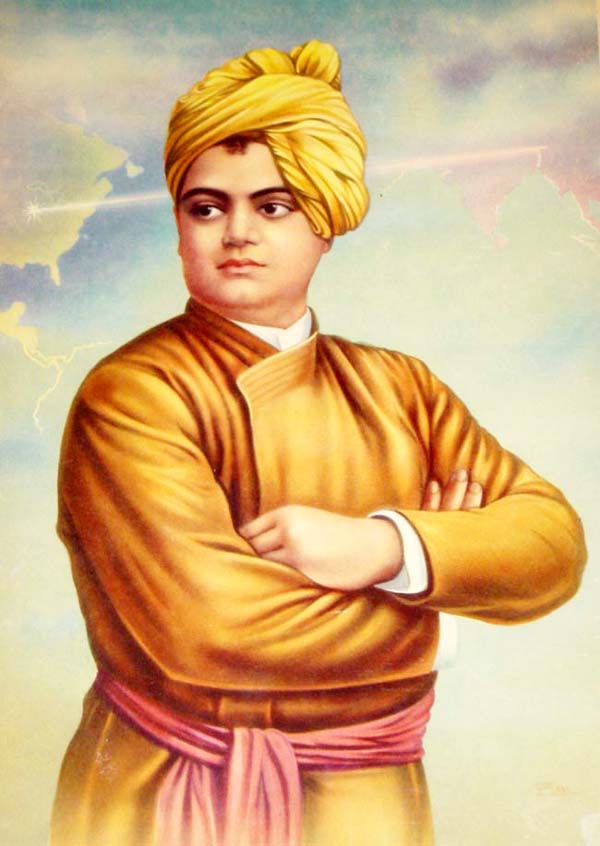Kiran Kanchan
Swami Vivekananda was born in 1863 in a Kshatriya family of Calcutta. Before he became monk, his name was Narendra Nath Datta. While he was a student in college at seventeen years of age, he came under the influence of Sri Rama Krishna Parmahansa, Narendra Nath was an earnest student of philosophy and poetry. He broadcast the truths of Vedanta in India, Europe and America, as realized in the experience of Sri Rama Krishna. He urged for the uplift of the masses and wanted to make them strong and self reliant. As he had sympathy for the poor and down trodden in India; he was a fore runner of Mahatma. He recommended Vedanta for all without any distination of the caste, colour, creed or sex.
Concept of God
God is omnipresent and impersonal. He is manifested in all the creatures on earth. Man is an incarnation of God. Worship of man is the true worship of God. To him the ideal of Vedanta is to know man as he really is He asks, “if you cannot worship your brother man, the manifestation of God, how can you worship a God who is unmanifested? If you cannot see God in the human face, how can you see in the clouds or in the images made of dull, dead matter, or in mere fictitious stories of your brain? I shall call you religious from the day you begin to see God in men and women.” Thus Vivekananda teaches external communication of man with God. He advocated a religion of universal oneness and cosmopolitanism. Realization of divinity or the knowledge of Brahman is the ultimate goal for man.
According to Vivekananda “Perfection is not be attained, it is already within us. Immorality and bliss are not to be acquired, we possess them already, they have been ours all the time.” According to Swami Vivekananda education is the process of self development. The child educates himself. True improvement is self inspired. We want that education by which character is formed, strength of mind is increased, the intellect is expanded and by which one can stand on one’s own feet.” Vivekananda holds the view that knowledge is inherent in man, sometimes inside him not born out of external environment. True knowledge does not come to the individual from outside. It is instead discovered within the individual because man’s soul within him is the source of all true knowledge. The external world is only the suggestion, the occasion which sets you to study your mind. The falling of the apple gave suggestion to Newton and he studied his own mind. He rearranged all the precious limits of thought in his mind and discovered a new link among them which all the Law of Gravitation. “Education thus according to Swami Vivekananda, has the function of discovering or uncovering knowledge that lies hidden in your mind. A person’s level of education is judged not by the number of books he has read but by the thickness of the coat of ignorance lying on this mind. As the light of knowledge increases, the coat of ignorance gradually recedes into the background. Man has all the knowledge. He requires only an awakening. Like Froebel, Swami Vivekananda thinks that the child develop his own nature as the plant does his own. The teacher is to arrange the necessary environment. They should not be scolded every now and then. Positive ideas should be given to them. Kindness and encouragement should help them to solve the various problems of life. He believes that the root cause of all evils in India is the poverty of the people. He considers education as the soul remedy for improving the condition of poor in the country. By education he wants to develop their lost individuality. The gems of spirituality stored in our scared books should be brought to the common and by spreading education in the masses through the medium of mother tongue. He wanted to train the child in India into the various aspects of Indian customs, manners, culture and philosophy and acquire the knowledge of various civilizations of the would for which he advocated national system of education. Vivekananda was on ardent advocate of women education. He believed that the uplift of the women must come first and then only can any real good come out for the country, for India. While emphasizing women education he said, “Educate your women first, then they will tell you what reforms are necessary for them. He himself says, “where women are respected there are good delight; and where they are not, there all works and efforts come to naught.”
He recommends that daughters should be treated like sons. He places the ideal of Sita for Indian women. He wanted to give a type of education that may make women selfless, fearless and brave like Ahalya Bal and Mira Bal. He held that along with other things, women should acquire the valour and heroism of Rani Jhansi. Such mothers will produce ideal citizens. Vivekananda felt that both self realization and character building are impossible in the absence of physical development and education. In a conversation Vivekananda said that people must know the secrets of making the body strong and they should convey this knowledge to all.
He himself took physical exercise as part of his daily routine. He said power is life weakness is death. Vivekananda on the one hand stressed the study of Vedanta Upanishadas, Puranas, Religion and philosophy for spiritual development while on the other he stated the importance of scientific education. He believes that what is really needed in India is harmony between western science and Indian Vedanta. Only a synthesis between Vedanta and Science can inspire man to use the resources of science for peaceful proposes and the progress of mankind.
Trending Now
E-Paper


